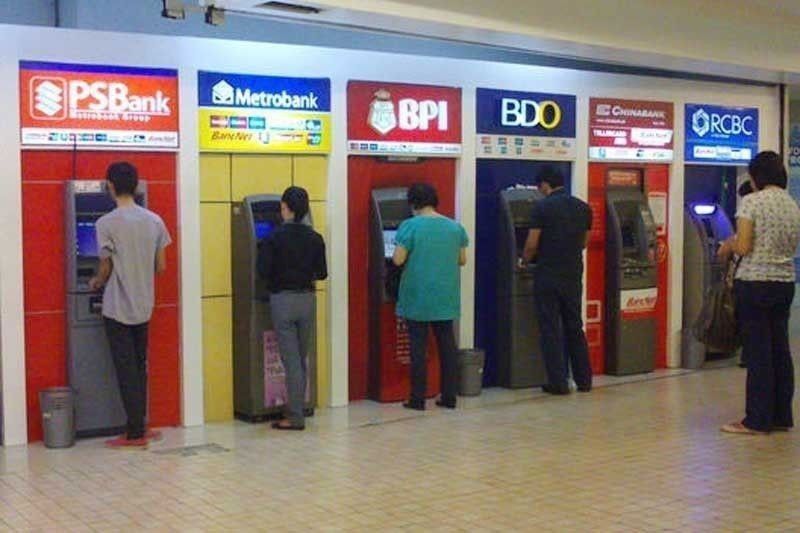More banks to charge higher ATM fees

MANILA, Philippines — More banks are set to impose higher fees for ATM transactions done by non-bank clients using their networks amid the shift to a new charging method starting April 7.
Under the new method, a cardholder would be charged for a withdrawal transaction or balance inquiry based on the fees of other banks or ATM owners.
This is a complete deviation from the current issuer-based method, wherein the fee is set and charged by the issuing bank and the amount charged to the cardholder remains the same regardless of who the ATM acquiring bank is.
Metropolitan Bank & Trust Co. (Metrobank) and its thrift bank arm Philippine Savings Bank (PSBank) are set to impose an P18 fee per withdrawal and P2 per balance inquiry for non-Metrobank and PSBank cardholders using their ATM networks.
“Beginning April 7, fees for cash withdrawals and balance inquiries will be set by the bank that owns the automated teller machines that you are using.?? Metrobank cardholders transacting on other banks’ ATMs will be charged fees set by the ATM’s owners,” Metrobank said in an advisory.
The bank said transactions by Metrobank debit or prepaid cardholders are still free of charge, while PSBank cardholders would get a special rate of P7.50 per cash withdrawal on Metrobank ATMs.
Likewise, Metrobank cardholders using the ATM network of PSBank would get a special rate of P7.50 per withdrawal.
Under the new method, PSBank said it would no longer charge withdrawal and balance inquiry fees to its own cardholders when they use their PSBank-issued cards in other banks’ ATMs starting April 7.
“Instead, the ATM owner shall be the one charging a fee for each withdrawal or balance inquiry transaction. The said fee shall be immediately deducted from the cardholder’s account together with the amount withdrawn, while the balance inquiry fee will be shown as a separate debit amount,” PSBank said in a separate advisory.
PSBank said withdrawal and balance inquiry fees could vary per ATM owner.
“Such fees will be displayed on the screen with the option given to the cardholder to cancel the transaction if he/she does not wish to pay the fee or decide to look for another ATM with lower fees,” PSBank said.
Metrobank currently charges its clients P11 when they use the ATMs of other banks to withdraw cash, while PSBank charges P10 per withdrawal under the current set up.
Philippine National Bank (PNB), on the other hand, will impose a P15 fee for withdrawals by non-PNB cardholders under the new set up starting April 7, higher than the P11 charge imposed under the current method.
“To avoid charges, transact at PNB ATMs,” the Tan-led bank said in an advisory.
BDO Unibank Inc. also urged its cardholders to transact in the bank’s 4,000 plus ATMs as banks are set to impose charges for cash withdrawal and balance inquiry outside of their networks.
“We encourage BDO cardholders to use our 4,000 + BDO ATMs to continue to withdraw for free. Using your BDO card at non-BDO ATMs will incur fees which may vary depending on the bank,” BDO said in an advisory.
BDO is set impose a P18 per ATM withdrawal and P2 per balance inquiry done by non-BDO cardholders in its network.
The BSP last April 2018 lifted a moratorium on ATM fees imposed in September 2013 under Memorandum M-2013-044 that maintained a status quo in terms of both service fees and connectivity arrangements.
The BSP issued Memorandum No. 2019-020 in July 2019 reminding BSP- supervised financial institutions to adhere to the principles of reasonable and market-based pricing in setting their ATM fees.
The memo also called for the adoption of an acquirer-based charging method, wherein the amount to be charged to a cardholder shall vary depending on the ATM terminal being used.
The new method allows ATM owners to directly compete for business with one another by disclosing fees and offering lower charges than other ATMs in the vicinity.
Under the current issuer-based charging method, ATM fees charged by banks ranged between P11 and P15 per transaction on their clients, but the fees only apply if a bank client uses an ATM that is not owned by his or her bank.
- Latest
- Trending


























